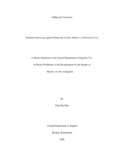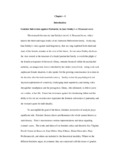Please use this identifier to cite or link to this item:
https://elibrary.tucl.edu.np/handle/123456789/2908| Title: | Feminist Subversion against Patriarchy in Jane Smiley's A Thousand Acres |
| Authors: | Ojha, Chet Raj |
| Keywords: | English literature;Jane Smiley;A Thousand Acres;Novel |
| Issue Date: | 2008 |
| Publisher: | Central Department of English Kirtipur, Kathmandu |
| Abstract: | This research attempts to analyze Jane Smiley's novel A Thousand Acres, probing into the problem of male exploitation and oppression of females in patriarchal society. Theories of feminism are taken as the methodological tool particularly the theories of Mary Wollstonecraft, Virginia Woolf, Simon de Beauvoir, Elaine Showalter and Mary Ellman to analyze how the patriarchal excesses cause the downfall of the family with females being degraded and denigrated. Most importantly, the research foregrounds on the struggle of females and their attempt to release themselves from the clutches of patriarchal discriminatory normativities so as to live a life with independence and without any restrictions within the farm and domesticity. The American Midwestern farming family is ensnared by the tragic circumstances of oppressive nature of the head of the family, Larry Cook, who not only keeps the daughters in restrictions and demands their support to bolster his socio-economic status in his daily business, but also exploits and abuses them in all ways that an excessive force commits. It's particularly Ginny, the daughter, who loses patience with such excesses, turns aside from supporting him; defeats him in the court case; abandons him and other patriarchal forces including her own husband; starts working in a restaurant in the city by taking responsibility of the two daughters of Rose; and lives with the fully pleasant and satisfied life. |
| URI: | http://elibrary.tucl.edu.np/handle/123456789/2908 |
| Appears in Collections: | English |
Files in This Item:
| File | Description | Size | Format | |
|---|---|---|---|---|
| Cover page.pdf | 70.91 kB | Adobe PDF |  View/Open | |
| thesis.pdf | 244.56 kB | Adobe PDF |  View/Open |
Items in DSpace are protected by copyright, with all rights reserved, unless otherwise indicated.
